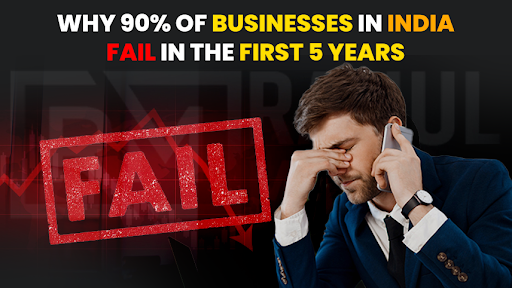
Why 90% of Businesses in India Fail in the First 5 Years
Each year, thousands of driven entrepreneurs in India chase their dream of building a business from the ground up. From small kirana shops in Tier 2 towns to fast-scaling tech startups in Bengaluru and Mumbai, the spirit of entrepreneurship runs deep across the country. But behind this growing ambition lies a silent crisis: 90% of these businesses shut down within just five years.
It’s a number we rarely talk about. But for the entrepreneurs who experience it, the impact is personal, painful, and often life-changing. Dreams are crushed. Families feel the heat. Confidence takes a hit. And more often than not, people are left wondering, What went wrong?
Was it the market? The competition? A lack of funding? Or something deeper?
This blog isn’t here to scare you. It’s here to give you clarity. Whether you're a business owner fighting to stay afloat or a first-time founder preparing for launch, this is the truth you deserve to hear, not sugar-coated, not overly technical, but practical, real, and designed for someone just like you.
Let’s walk through the actual reasons why most businesses in India fail, and more importantly, how you can make sure yours doesn’t.
Let’s start with a hard truth.
Most businesses in India don’t die because of bad ideas.
They die because of something far more invisible: bad decisions, poor planning, and silence in moments that needed clarity.
It’s heartbreaking.
People lose their savings. Families feel the pressure. Entrepreneurs lose their confidence.
And yet, every year, lakhs of new businesses are launched in India. Full of hope. Full of hustle.
But five years later, only 10% survive.
Why does this happen? But the real question is, how do you make sure it doesn’t happen to your business? Don’t worry, we’ll walk through it together, step by step, just like a real conversation. No jargon. No theory. Just truth, insight, and a path forward.
It starts with a dream.
You see a problem. You imagine a solution. You believe you can build something big.
That belief turns into a business. You put in the money. You work day and night. You sacrifice weekends, sleep, and sometimes, even your peace.
But then something goes wrong.
The customers don’t come. The money runs dry. Your team begins to fall apart.
You feel stuck. You feel tired. You feel alone.
And before you know it, your business is one of the many that didn’t make it past the five-year mark.
In India, this is more common than you think. Almost 9 out of 10 businesses fail within the first five years. That’s not just a number. It’s the reality of countless entrepreneurs who started strong but lost their way.
So what really goes wrong? Why do so many businesses in India fail so early?
But the real question is, how do you make sure your business doesn’t end up the same way?
Let’s break it down, one real challenge at a time.
The Mistake of Starting Without a Clear Plan
Most Indian entrepreneurs begin with a lot of passion. That’s beautiful. But passion alone isn’t enough.
What many miss is clarity about what they’re offering, who they’re offering it to, and how they’re going to sustain it.
I once spoke to a shop owner in Jaipur who opened a new electronics store. His pricing was good, his products were genuine, and his location was decent. But within a year, he shut down.
When I asked why, he said, “Mujhe laga chal jaayega.” That was the only plan.
He didn’t study the local competition. He didn’t check what his customers really wanted. He didn’t have a clear marketing or operations strategy. He assumed the footfall would come.
This is a common story across India, from small towns to metro cities.
People start businesses based on assumptions. Not research. Not validation.
And when reality doesn’t match the assumption, the business begins to fall apart.
Cash Flow Problems: The Silent Killer
Money is the lifeblood of every business. But in India, most small businesses run without tracking their finances properly.
They know how much is coming in. But they don’t always know how much is going out.
They don’t separate personal and business expenses.
They don’t plan for slow months or emergencies.
In the beginning, it didn't feel like a problem. But slowly, the cracks begin to show.
Suppliers aren’t paid on time. Salaries get delayed. You borrow personal loans just to keep your business running, but that’s not a sustainable strategy.
And before long, the business is running on fear, not funds.
What makes this worse is that most business owners never talk about it.
They think they’re the only ones struggling. But the truth is, cash flow issues are one of the biggest reasons businesses shut down early.
And it’s not just about not having money. It’s about not knowing how to manage it.
Doing Everything Alone Leads to Burnout
In the beginning, you do it all. You’re the founder, marketer, accountant, delivery person, and customer service executive. And for a while, it works.
But slowly, the weight starts pulling you down.
You forget to eat. You skip sleep. You stop spending time with family. Your health suffers. Your mental peace disappears.
And without realizing it, your business becomes a burden, not a dream.
Many Indian entrepreneurs believe they can’t afford to hire help.
But what they often don’t see is this: not hiring smartly is far more expensive in the long run.
When you're burnt out, your decisions suffer. Your energy drops. Your creativity vanishes.
And your business begins to reflect that chaos.
To survive beyond five years, you need a team. Not a big one, but the right one.
Even one or two committed people can create structure, free up your time, and bring new ideas to the table.
Ignoring Marketing Until It’s Too Late
Even if your product is world-class, it won’t matter unless people know it exists. But if no one knows about it, it doesn’t matter.
In India, many businesses still believe in word-of-mouth as their primary growth strategy. While it does help, it’s not enough anymore.
We live in a digital age. People search for everything online, from where to eat, what to buy, to whom to trust.
If your business doesn’t show up when people search, you’re invisible.
I met a small business owner in Indore who made beautiful handcrafted soaps. But she wasn’t online. No website. No social media. No ads. Just hoping customers would walk in.
She had something special. But she was playing hide and seek in a world that runs on visibility.
Marketing isn’t a side task. It’s not optional.
It’s the driving force that keeps your business moving forward every day. Without it, even great businesses fade away.
Depending Too Much on One Source of Income
Many businesses in India make this risky mistake.
They rely on one product. One service. One big client.
It works for a while. But then that client leaves. Or that product stops selling. And suddenly, everything collapses.
Diversification isn’t a fancy word. It’s a survival skill.
Smart entrepreneurs build multiple income streams, slowly, steadily, and strategically.
It doesn’t mean doing too many things at once. It means being ready for change.
Because if COVID-19 taught us anything, it’s that businesses built on one leg can’t stand during a storm.
Not Evolving With Time
The market changes. Customers change. Technology changes.
But many businesses don’t.
They stick to what they’ve always done, because it’s comfortable.
But in business, comfort is dangerous.
Look at how quickly digital payments took over.
Or how e-commerce changed the retail landscape.
Or how customers now expect delivery, support, and updates, all at their fingertips.
In today’s fast-changing market, if your business isn’t evolving, it’s getting left behind.
I know a garment trader who refused to accept online orders because “mera kaam waise hi chalta hai.”
Now his competitors sell on Instagram, Amazon, and WhatsApp. He’s struggling to survive.
The point is, survival is not about being the biggest.
It’s about being the most adaptable.
No Systems, Just Reactions
Most Indian MSMEs work in fire-fighting mode.
A problem comes. They fix it. Another problem comes. They fix that too.
But they rarely build systems to prevent those problems in the first place.
When there’s no process for sales, service, hiring, or reporting, everything becomes reactive.
You're stuck in a loop, busy all the time, but your business isn’t really growing.
Businesses that scale don’t depend on the founder alone.
They depend on systems that run with or without the founder.
That’s how you go from being a busy owner to a calm CEO.
Rahul Malodia often shares this in his programs: if your business can’t survive without you, it’s a risky setup, not a real company.
Emotional Pressure: The Hidden Weight No One Talks About
It’s not easy to talk about, but it’s something we can’t ignore.
Running a business in India is not just a financial decision. It’s an emotional one.
You deal with family expectations. Society’s opinions. Financial stress. Self-doubt.
You smile in front of customers, even when you’re breaking inside.
When business hits a rough patch, you often turn inward and take all the blame.
And when people around you say, “Naukri kar lete toh better hota,” it hurts.
But here’s what you must remember: failure is not a sign of weakness.
It’s often just a result of missing guidance.
You were never taught how to build systems, manage money, or scale teams in school.
So if things are tough right now, it’s not your fault.
But staying stuck without seeking help is a choice.
What the 10% Do Differently
So, how do the few that survive actually make it?
They don’t have magical products. They don’t have secret investors.
What they do have is a different mindset.
They track their numbers daily. They build systems before they scale.
They delegate. They invest in learning. They test, fail, and try again.
And they treat their business like a real asset, not just a side hustle or family tradition.
They know that if they don’t grow, they’ll be left behind.
And they act accordingly.
You Don’t Have to Be in the 90%
If you’re reading this, chances are you’re already ahead.
You care. You’re curious. You want to do better.
And that’s where real transformation begins.
You don’t need a new business idea.
You need a new approach, built on planning, learning, and adapting.
Be real about what’s holding you back; that’s where real growth begins.
Then get the help, tools, and mindset to fix it, not overnight, but over time.
Because in the end, survival isn’t about being lucky.
It’s about being prepared.
And the next five years of your business?
They can either be the reason you quit…
Or the journey you’ll one day tell with pride.
Final Thought:
Most businesses fail not because the idea was weak, but because the foundation was.
Strengthen your foundation. Build the skills.
Ask the right questions. Make tough changes.
90% fail. But you, you don’t have to. And whenever you feel stuck, just know help is always within reach. Help exists. You just need the courage to reach for it.
- BusinessSuccess
- Small Business
- Business case study
- Market Analysis






